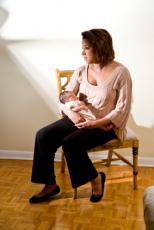Responding to intimate partner violence in home visitation programmes
Wed 26 Feb 2014
The potential of home visitation programmes for preventing and responding to intimate partner violence (as well as child abuse and neglect) is ...

The potential of home visitation programmes for preventing and responding to intimate partner violence (as well as child abuse and neglect) is highlighted in resources from US-based Futures without Violence.
Healthy Moms, Happy Babies: A Train the Trainer Curriculum on Domestic Violence, Reproductive Coercion and Children Exposed is designed to support the development of a core competency strategy to ensure maternal infant and early childhood home visitation programme workers are equipped to respond to mothers experiencing intimate partner violence. A hard copy is available for loan through the Clearinghouse library.
The interactive training curriculum includes resources to support programme workers in responding to intimate partner violence, including a 'Relationship Assessment Tool' which has been adapted and piloted for home vistation. The training covers:
- How Domestic Violence Affects Home Visitation Goals and Staffing
- Brief Overview of Domestic Violence: Definitions and Dynamics
- Screening and Safety Planning for Domestic Violence in Home Visitation
- Impact of Domestic Violence on Perinatal Health Outcomes
- Making the Connection: Domestic and Sexual Violence and Reproductive Coercion
- The Effects of Domestic Violence on Children
- Impact of Violence on Mothering and Promoting Resiliency for Children
- Childhood Exposure to Violence and Its Impact on Parenting
- Preparing Your Program And Supporting Staff Exposed to Violence and Trauma
- Fathering After Violence
- Mandated Reporting for Child Abuse: Challenges and Considerations
Futures without Violence says, "What one says and how it’s said—whether by direct assessment or through universal education—matters and can be the difference when developing trusting relationships with mothers".
In New Zealand, evaluation of Home Visitation programmes include the Early Start and Family Start programmes (2005) and the Early Start evaluation report: Nine year follow-up (2012). Early Start is a home visiting service targeted at families with infants who are facing severe social, economic or emotional challenges. Findings from the nine year follow-up "suggests Early Start has beneficial effects for a series of child related outcomes spanning health, pre-school education, service utilisation, child abuse, parenting, and child behaviour."
US based programme Nurse-Family Partnership (NFP) has data establishing its effectiveness as an intervention in preventing child abuse and neglect. The programme connects vulnerable first-time parents with caring maternal and child health nurses providing support through pregnancy to the child's second birthday. Validated by three randomised controlled trials (RCTs) conducted in 1977, 1988 and 1994 across three diverse populations, the programme has shown to dramatically improve life outcomes for both the mother and child. Consistent programme effects include: improved prenatal health, fewer childhood injuries, fewer subsequent pregnancies, increased intervals between births, increased maternal employment and improved school readiness. In addition, the RCTs found reductions in child abuse and neglect and health-care encounters for injuries.
Other US research on home visitation programmes include a United States Systematic Review: The Effectiveness of Early Childhood Home Visitation in Preventing Violence (2005).
Image: iStock


